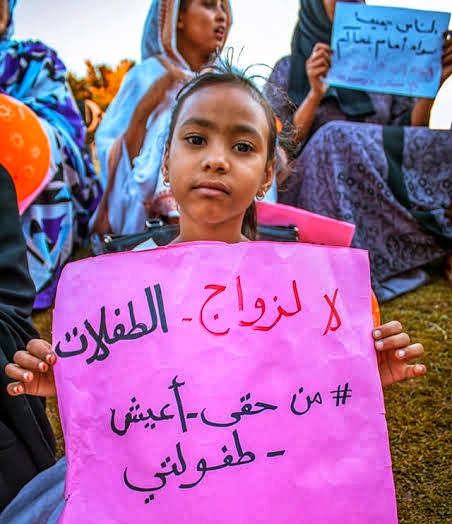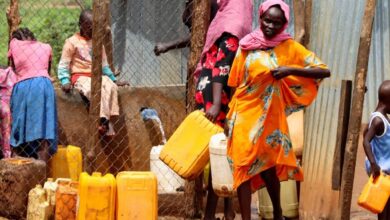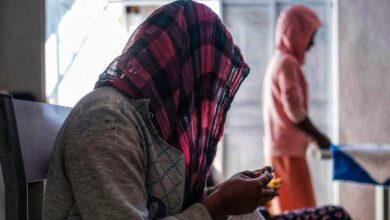
As the war in Sudan enters its 25th month, the phenomenon of child marriage has significantly increased, especially in the states of South and West Kordofan. In an effort to protect girls from conflict-related sexual violence, some families have resorted to marrying off their daughters—leaving them as silent victims of circumstances they never chose.
Child marriage has been on the rise due to the consequences of armed conflict, with various social motivations. Some fathers marry off their daughters out of fear of kidnapping in regions marked by ongoing violence.
Nawal, who gave only her first name, is one of the many victims of early marriage brought on by the current war. She lives in the Al-Qoz area in South Kordofan. Speaking with sorrow, she said, “My father encouraged me to marry someone outside the family when I was just 13 years old. The marriage took place last March, and I moved to a distant state. I now fear serious consequences in the future.”
She told Mashawir that her family convinced her marriage was the only option in these difficult times, especially with the rise of sexual violence associated with the conflict. Her father had also lost his job in the capital, Khartoum, and could no longer support her education.
Nawal said she hopes to “live a happy and safe life with her husband” and not be deprived of continuing her education because of family responsibilities.
Multiple Drivers
Psychologist Najlaa Abdel Mahmoud told Mashawir that “the phenomenon of child marriage is a crime by all humanitarian, legal, and social standards. The war has contributed to a rise in the number of underage girls being married, especially in conflict zones and among families displaced to camps from urban areas. Many do this without considering the consequences, and some rural communities even consider child marriage part of their social traditions.”
She added, “Some families marry off their young daughters out of fear of rape, abduction, or forced disappearance. Others do so for financial reasons—to obtain a dowry and meet daily needs. We cannot ignore the role of patriarchal culture, which exploits the conditions of war to pressure girls and control their fates.”
Abdel Mahmoud explained that “thousands of girls have been denied their right to education and to choose their life partners. Most of these marriages happen outside formal courts, using only a religious officiant. This often leads to divorce and social disintegration.”
International Concern
Meanwhile, Save the Children stated in a press release that armed fighters are sexually assaulting and raping teenage girls “in alarming numbers.”
The United Nations has reported a “notable increase” in gender-based violence. Arif Noor, Save the Children’s Country Director in Sudan, said, “We know that the official figures are just the tip of the iceberg. Girls as young as 12 are being targeted because of their gender, ethnicity, or vulnerability.”
He added, “Some parents are marrying off their daughters at an early age in an attempt to protect them from sexual assault.”
Reports have also emerged of girls being held for days and subjected to sexual abuse, including cases of gang rape.
UN agencies stated in a joint report: “Healthcare providers, social workers, counselors, and community protection networks have warned of a significant increase in gender-based violence reports amid ongoing hostilities across Sudan.”
Distorted Protection Mechanisms
Salima Ishaq, Head of the Unit for Combating Violence Against Women and Children, said, “Protection mechanisms are distorted and do not effectively safeguard girls from conflict-related violence. Families are resorting to early marriage out of fear of violations or to secure a new life amid an uncertain national future—especially during displacement.”
She expressed concern over the increasing number of girls being kidnapped in conflict areas, especially minors.
She pointed out that “all women in Sudan are at risk of sexual violence because the war has spread across several regions.”
Distorted Beliefs
Social researcher Nada Al-Hadi explained that “the child marriage phenomenon has spread widely in conflict zones for several reasons, most notably the need to protect girls from sexual violence in the absence of real protection mechanisms.”
She added, “Adolescent girls in Sudan are at high risk of sexual violence due to distorted beliefs about sex with minors—such as the myth that it increases virility or the misconception that young girls are free of sexually transmitted infections because they are presumed virgins.”
She continued, “This phenomenon has led to various consequences, including suicides among young married girls who cannot cope with domestic pressures, along with health and social problems.”
Al-Hadi added, “Psychologically, child brides may suffer from hysteria, fear, anxiety, and depression, which can eventually develop into obsessive-compulsive disorder or schizophrenia—if they don’t end their lives through suicide or turn to substance abuse.”
Motives and Pressures
For her part, community activist Buthaina Hamad, who works in displacement centers in the city of Al-Fula in West Kordofan, explained that there are multiple factors in these camps pushing families to commit acts of violence against women—especially underage girls.
She said, “Domestic violence in the region is clearly manifested in the practice of child marriage by parents, driven by fear of assault and other risks that are not yet fully identified.”
The activist stressed that “the pressures resulting from ongoing conflict have led families to marry off their daughters at an early age—based on their own assessments of how to cope with the dire conditions caused by the war.”




